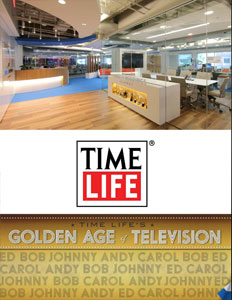Palm Springs Convention Center – The Meeting Oasis
Those of a certain age – Baby Boomers and older – might remember when the Time Life Company, which published two of America’s most popular magazines, Time and Life, first gained fame as a seller of books. Founded in 1961, as the book marketing division of Time, Inc., over its life span, Time Life published hundreds of well-respected science, history, and do it yourself book series and sold them to its magazine subscribers and millions of others by direct mail. Several of those book series garnered substantial critical acclaim – unusual for a mass-market, mail order house. The company ended its book publishing operations in 2003, but its books can still be found in school libraries and used-book stores throughout the country.
In 1966, Time Life added music to its offerings, selling box record sets and collections via its Time-Life Records subsidiary. Throughout the 1970s and 1980s, the selection of music grew to include classical, jazz, swing, opera, pop, country, rock, and show tunes. As consumer preferences changed, Time Life switched to selling cassettes and then to CDs in the mid-80’s. In time, documentary videos and Classic TV offerings began making their appearance and were added to the company’s portfolio of products first via VHS and then via DVD formats.
In 2003, Time Life was acquired by Zelnick Media and Ripplewood Holdings and was renamed Direct Holdings Global, an entertainment and multi-channel marketing firm that took on the old company’s brand with the aim of building upon its successful business model, while simultaneously attempting to grow its reach via the infusion of new products and new ways of getting those products to its customers.
“Over the last 55 years, the business has evolved dramatically,” says Chris Hearing, President of Direct Holdings Global. “We are, today, a hundred million dollar, multi-channel marketer. We sell entertainment, lifestyle products, and entertainment experiences all through a sophisticated multi-channel marketing strategy. It’s largely TV-driven, but we’ve also got a significant digital business. We sell through home shopping channels; we sell retail; and we have international distribution.
Hearing explains the components of the privately-held company. “There are really three businesses, or three separate product lines,” he says. “One is classic entertainment – the Time Life-branded product. Our core business, today – probably 60 percent of our revenue base is under the Time Life brand. That’s the music product and classic TV DVDs – the nostalgic entertainment. Some of our biggest products, today, are a Classic Love Songs of Rock and Roll, an Easy Listening Collection, the Complete Carol Burnett Variety Show Collection, all the Bob Hope Specials, and Hee-Haw.”
“The second business,” Hearing continues, “is called the Lifestyle Products Group which sells, via that same multi-channel model, household, fitness, and health and beauty products.” The Group has also ventured into other realms of the Direct Response Television space with a marketing strategy that integrates PR, television, web, and social media. “Right now, we’ve got a joint venture with Wolfgang Puck appliances; we’ve got a high-tech oven that we’re selling that integrates pressure cooking into a countertop oven to speed cooking while improving flavor,” Hearing says.
“The third company is a live entertainment business, and it’s our most rapidly-growing division,” he adds. “We do themed music entertainment. We charter luxury cruise ships for a week at a time and do things like the Soul Train Cruise, or the Flower Power Cruise, or the Malt Shop Memories Cruise. We bring on all the nostalgic entertainment that we’re selling in our CD collections to our passengers as live entertainment. A lot of those performers are still performing at a very high level. And so, for example, we will fill a cruise ship with people who want to re-live the Soul Train years of the ‘70s and early ‘80s. We have Earth, Wind, and Fire, we have Smokey Robinson, we have tons and tons of acts – it’s a floating music festival.”
Hearing explains that his customers tend to be the very same ones who can remember when the original Time Life Company first began marketing its media. “We are a 50-plus marketer; our market is the Baby Boomer and older,” he says. “It’s the largest-growing population in the country and will be for the next ten-plus years. So, by the time that folks are hitting their fifties, they are really starting to feel nostalgic for the times when they were in their teens and twenties. That’s when people are aging into our demographic target.”
And that demographic is constantly being aimed at by Direct Holding’s 60-person staff, based in northern Virginia. “The 60 people focus mainly on product development and marketing,” says Hearing. “They conceptualize the products; put terrific marketing campaigns together; and then bring it to market via all of our channels. We outsource operational areas of the business; things like answering telephones, running the website, warehousing, and shipping products; that’s all outsourced to third parties. So, the staff here is really focused on one of two things – either the creative pursuits of creating and marketing our products or managing third parties that handle operational things for us.”
When asked about Direct Holdings Global’s competition, Hearing breaks down the company’s three divisions: “In terms of our nostalgic entertainment, competition for selling sets of CDs or TV collections is actually pretty limited,” he admits. “There are not very many people that do that. But, we’re competing with ITunes, and Netflix, and Amazon Prime, who are delivering a lot of the same content. They’re delivering it digitally – we’re delivering it in physical format. So, we do have competition in a digital delivery sense. But you can get all sorts of different, ancillary products only in a physical form – you can’t get them digitally.” For example, Hearing says that the Carol Burnett Collection comes with a companion book that can be autographed by Burnett, herself.
“In our lifestyle business, there are definitely more entrenched competitors out there in the multi-channel marketing space, so we do have pretty well-developed competition in that marketplace, Hearing says, “whether it’s Euro-Pro, or Guthy-Renker. They’re major players.”
“In the live entertainment, we are one of the biggest that do themed music cruises,” he says. “There are two or three others, but we’re in that top tier of competitors in that marketplace. We launched the live entertainment business seven years ago, and it has doubled in size each of the last three years. And we’re expecting it to double again, next year, and continue to grow at a very rapid rate from that point forward. There’s a tremendous amount of opportunity in that space, both at sea, as well as on land, doing targeted, themed festivals. Our business model is evolving in that direction; it takes advantage of a lot of the things that we do very, very well and we think there’s a significant revenue opportunity for us for the foreseeable future.”
While Direct Holdings has taken the very best of the older, Time Life business model, evolved it into a modern, multi-channel marketer with an expanded portfolio of products and services, Hearing is not unmindful of the fact that the industry in which it functions continues to change with lighting speed. “Historically, it was TV-driven,” he says. “You put a commercial on air and people picked up the phone, called an 800 number, and ordered their product. Today, we’re still putting commercials on air, but we know that for every person who’s picking up the phone and calling us, ten people are going to their tablet, or looking at their phone, or sitting at a desktop and doing research, or going to our website, or going to Amazon, or going to all the other places, sometimes buying and sometimes not. So, there’s a tremendous evolution in our industry and, consequently, in our business, just in how we reach consumers, and the ways we’re reaching them, and the messages we’re using to reach them.”
Hearing believes, however, that that very shift in the marketplace is fraught with possibilities. “It’s very different than it’s been in the past, but frankly, there’s far more opportunity now to target delivery to consumers in ways that you could never have done in a TV advertising campaign,” he states. “It’s changing rapidly, but it’s really exciting and opens up a lot of opportunity for us as we continue to evolve.
“So, on the multi-channel side of the business, we’re focusing our efforts on trying to find good ways to blend content and commerce. What I mean by that is out of the digital landscape there are a lot of companies that do a very good job delivering content and there are a lot of companies that do a very good job of delivering commerce. We think that there’s a great opportunity to blend those things and find a mix of content and commerce in a way that we can engage our customers, and engage a lot more of them than we are today, through a content platform and also drive them to do commerce with us in that same digital platform.”
As an example of that blending, Hearing points to Soul Train – the iconic musical variety program that presented R&B, soul, hip-hop, funk, jazz, and disco music over a 35-year span. “So, we sell Soul Train DVDs and we’ve got a robust Soul Train Cruise. Each one of those things is a separate commerce transaction,” he explains. “But, there’s also an opportunity around providing content – the history of Soul Train; where these artists are now; performances online from back in the ‘70s and performances by the same artists, today; to get people who are interested in Soul Train content into an online environment to learn more about that genre of music and then take advantage of that interest and that awareness to then drive them to buy our DVD programs or sail with us on a Soul Train Cruise. We think our product line, and our ability to tell stories, and deliver video content effectively, which works very well in a digital setting, provides us a tremendous opportunity to really grow the business through that blending of commerce and content.”
While the Time Life Company, itself, has faded into history, Direct Holdings Global has continued to serve the very same customers that the original firm once catered to. “This is a business with a very long, very rich history that has done a pretty remarkable job over this 55-year life of evolving and re-inventing itself as the marketplace has changed – from its inception as a book publisher to today’s broad portfolio of products in many different genres and marketplaces,” Hearing states, proudly.
“Our product line has evolved tremendously; our marketing tactics have evolved tremendously; and the real story is what’s going to happen as the marketplace continues to evolve. We all know that the pace of change is increasing every single day, and we’re doing things to embrace that and evolve the business pro-actively so that we’re taking advantage of market opportunities and addressing the needs and wants of our customers. It’s a pretty compelling story – from the beginnings of the business to its incredibly bright future.”
______________________________________
AT A GLANCE
WHO: Direct Holdings Global
WHAT: A direct marketer of unique music, video, and lifestyle products, as well as a live entertainment producer
WHERE: : Headquarters in Fairfax, Virginia
WEBSITE: www.timelife.com
PREFERRED VENDORS
Holland America Line N.V. – Holland America Line is an American/British owned cruise line and a subsidiary of Carnival Corporation & plc. Originating in the Netherlands, the company is now based in Seattle, Washington, USA. From 1873 to 1989, it was a Dutch shipping line, a passenger line, a cargo line, and a cruise line operating primarily between the Netherlands and North America. As part of its rich legacy, it was instrumental in the transport of many hundreds of thousands of immigrants from the Netherlands to North America. Today, Holland America Line’s fleet of 14 modern classic ships offers more than 500 sailings a year, visiting 98 countries on all seven continents. Cruises include both popular and less-traveled ports in the Caribbean, Alaska, Europe, Mexico, South America, the Panama Canal, Australia, New Zealand, and Asia — as well as unique voyages to the Amazon, Antarctica and its extended Grand Voyages. www.hollandamerica.com
Celebrity Cruises Inc. – Celebrity Cruises was founded in 1989 with the objective of fulfilling the travel industry’s need for a high-quality, premium cruise product at an intelligent price. The company was determined to set a new, worldwide standard for cruising, and to create a distinctive expression of superior quality, grand style, attentive service, spacious accommodations, and exceptional cuisine. In 1997, Celebrity Cruises merged with Royal Caribbean International, bringing together two extraordinary cruise brands within one corporation, Royal Caribbean Cruises Ltd. Celebrity Cruises has a fleet of 11 ships and offers vacations to all continents. www.celebritycruises.com
Great Falls Holdings, Inc. – Great Falls Marketing, a subsidiary of Great Falls Holdings, Inc., provides superior direct response sales services, specializing in soft-offer conversion, and has a proven track record of increasing revenue for its clients. Great Falls is committed to customer success. The company works closely with its clients to ensure that every campaign meets or exceeds its goals. Its expertise in script development, campaign management, resource scheduling, telephone sales, and sales management add up to superior results and superior return on investment for its customers. www.greatfallsmarketing.com


